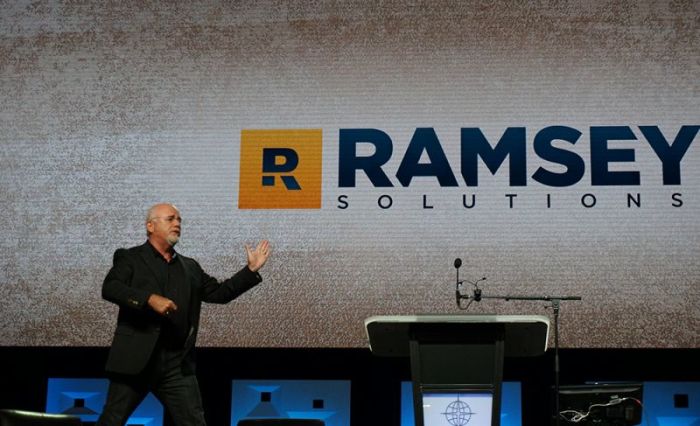Judge dimisses lawsuit against Dave Ramsey as class-action complaint moves forward

A lawsuit alleging that popular Christian financial advisor Dave Ramsey and his company engaged in religious discrimination and wrongful termination has been dismissed, while a class-action lawsuit alleging that the company defrauded thousands of his followers continues to move forward.
The Ramsey Solutions CEO and Christian radio host has been named as defendants in lawsuits in recent years. Ramsey Solutions, which falls under the umbrella of the Lampo Group, describes itself as a provider of "biblically based, commonsense education and empowerment that [gives] HOPE to everyone in every walk of life."
A lawsuit alleging that the Lampo Group wrongly terminated video editor Brad Amos for seeking to abide by COVID-19 preventative measures as the company and Ramsey allegedly urged employees to "pray away the disease" was dismissed by U.S. District Court for the Middle District of Tennessee Judge Eli Richardson in a Dec. 13 order.
The complaint accused Lampo of "retaliatory discharge" over Amos' questioning of the company's handling of the COVID-19 pandemic, contended that his dismissal constituted a violation of his religious beliefs and maintained that the company misrepresented itself when he first sought to obtain employment there.
Among other things, Amos accused the company of not instituting policies recommended by the U.S. Centers for Disease Control and Prevention during the COVID-19 pandemic and ridiculing those who wore masks and wanted social distancing enforced.
In an accompanying memorandum opinion, Judge Richardson stated that Amos and his lawyers didn't adequately show that he had been misled about his employment and that any guarantees of a drama-free work environment are matters of opinion.
A class-action lawsuit filed in the U.S. District Court for the Western District of Washington earlier this year will continue to move forward per a judge's order.
The class action lawsuit, bought on behalf of more than 10,000 individuals, contends that the Lampo Group and Happy Hour Media were paid tens of millions of dollars over more than five years by Reed Hein & Associates to advertise the services of the Time Share Exit Team on Ramsey's programming.
The lawsuit contends that the aim of the promotion was to "convince Ramsey's loyal followers to buy into this scheme through the use of deceptive, incomplete, and false information that Defendants knew or should have known was false and deceptive in violation of Washington State's Consumer Protection Act and the common law tort of negligent misrepresentation."
The lawsuit claims, "Defendants have been unjustly enriched by their participation in this scheme and are subject to disgorgement of their profits" and is asking a federal court to grant them more than $150 million in damages as well as attorneys' fees and costs.
The complaint alleged that Reed Hein & Associates "devised a scheme to convince thousands of unsuspecting working-class and middle-class consumers to pay more than two-hundred million dollars in exchange for a hollow promise to terminate those consumers' timeshare contracts."
An order issued on Dec. 5 by U.S. District Judge James Robart granted the plaintiffs' motion to amend their complaint. However, Robart also upheld an earlier decision handed down by the court granting The Lampo Group's motion to dismiss their unjust enrichment claim.
Robart noted that Washington court precedent has determined that unjust enrichment claims only apply in cases where plaintiffs "confer a benefit on the defendant." Since plaintiffs did not "confer a benefit" on Ramsey or The Lampo Group, the unjust enrichment claim did not hold up.
While the plaintiffs' motion to reconsider suggested that they could "plausibly allege a direct transfer of ownership" of their funds to the Lampo defendants, Robart did not agree. On Oct. 26, the same day they submitted their motion to reconsider, the plaintiffs also sought to amend their original complaint to "(1) add new claims for conversion and constructive trust; (2) include additional factual allegations related to their claims; and (3) correct typographical and formatting errors."
The claims for conversion, defined as "the unjustified, willful interference with a chattel which deprives a person entitled to the property of possession," were directed at all defendants. The defendants responded to the allegations of conversion by asserting that "plaintiffs' own allegations show 'that Reed Hein mixed customer funds with other money, and treated these comingled funds as general revenue, before ever paying money to the Lampo Defendants.'"
Therefore, the defendants concluded, "it is impossible to identify 'specific' and 'identical' money belonging to Plaintiffs, and subsequently received by the Lampo Defendants." Robart denied the plaintiffs' request to "add a stand-alone claim for constructive trust" while granting their request to amend their complaint to include additional allegations and correct typographical and formatting errors. He gave the plaintiffs until Dec. 15 to file an amended complaint that complies with his order.
The amended complaint, filed on Dec. 15, accuses Ramsey of violating the Washington Consumer Protection Act and insists that he "knew that Reed Hein cheated the Ramsey followers he referred to Reed Hein." Additional charges directed at all defendants include negligent misrepresentation, conspiracy and conversion. The lawsuit also includes a count of unjust enrichment directed at Ramsey and the Lampo Group.
Ryan Foley is a reporter for The Christian Post. He can be reached at: ryan.foley@christianpost.com





























